The Winter's Tale, Harlequinade/All On Her Own, Garrick Theatre | reviews, news & interviews
The Winter's Tale, Harlequinade/All On Her Own, Garrick Theatre
The Winter's Tale, Harlequinade/All On Her Own, Garrick Theatre
Kenneth Branagh's season begins with flawed Shakespeare, riotous Rattigan and a boozy unburdening
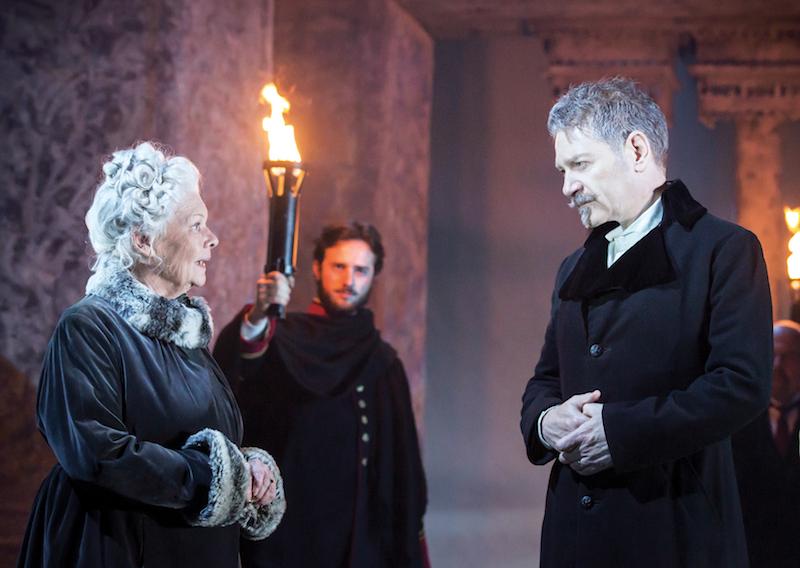
What exactly is the level of Kenneth Branagh’s self-awareness? He’s certainly conscious of inviting comparison with Olivier once again by presenting a year-long season of plays at the refurbished Garrick under the auspices of the Kenneth Branagh Theatre Company – and by taking on Olivier’s famous title role in The Entertainer.
One might read it as Branagh and co-director Rob Ashford’s canny attempt to ward off criticism in advance, particularly as their production of The Winter’s Tale (★★★) is guilty of many of those excesses. It bears the hallmarks of recent forays into Hollywood blockbuster, from Patrick Doyle’s overwrought music cues to Christopher Oram’s extravagant design, but has more in common with ITV’s new Jekyll & Hyde. As Leontes, the cheery king who suddenly becomes convinced his wife has been unfaithful, Branagh makes sense of Shakespeare’s accelerated timescale (Othello in miniature) by portraying the onset of jealousy as a Gothic horror demonic possession. He strains, he paces, he roars, each new suspicion a staggering body blow, and the madness that robs him of sleep leaving him wild-eyed and literally swooning. (Branagh pictured below with Hadley Fraser's Polixenes.)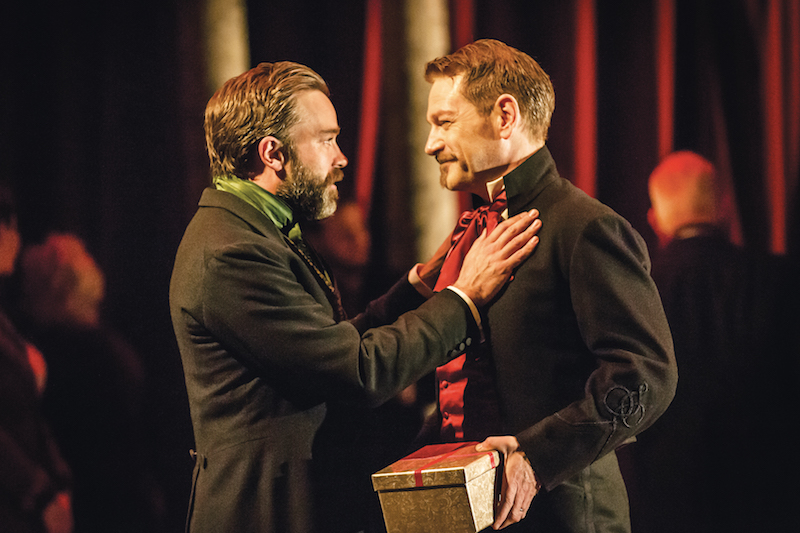 Compelling, certainly, but this melodramatic physicalisation of a psychological affliction soon grows wearisome. It’s in stark contrast to the real star turn, Dame Judi Dench as practical, grounded Paulina, who, with her luminously effortless verse speaking, proves passion need not be operatic to stir the soul. She’s the wry voice of reason, briskly dismissing Leontes’s cowed yes-men and reminding us that passively bearing witness to injustice is itself a sin. Paulina’s scolding here doubles as a compassionate lament for human failing, and her self-appointed role as keeper of Leontes’s “perpetual” penance stems from tender knowledge of what has been lost.
Compelling, certainly, but this melodramatic physicalisation of a psychological affliction soon grows wearisome. It’s in stark contrast to the real star turn, Dame Judi Dench as practical, grounded Paulina, who, with her luminously effortless verse speaking, proves passion need not be operatic to stir the soul. She’s the wry voice of reason, briskly dismissing Leontes’s cowed yes-men and reminding us that passively bearing witness to injustice is itself a sin. Paulina’s scolding here doubles as a compassionate lament for human failing, and her self-appointed role as keeper of Leontes’s “perpetual” penance stems from tender knowledge of what has been lost.
Dench also gives Time’s speech recounting the 16-year jump, which takes us from the Nutcracker-esque Victorian Christmas card of Leontes’s court – plush red velvet mirroring the Garrick itself, beaming carollers sprinkling snow, and picture-perfect ice skating – to the equally idyllic rural haven of Bohemia, so ripe with fecundity it might have escaped from the pages of Cold Comfort Farm.
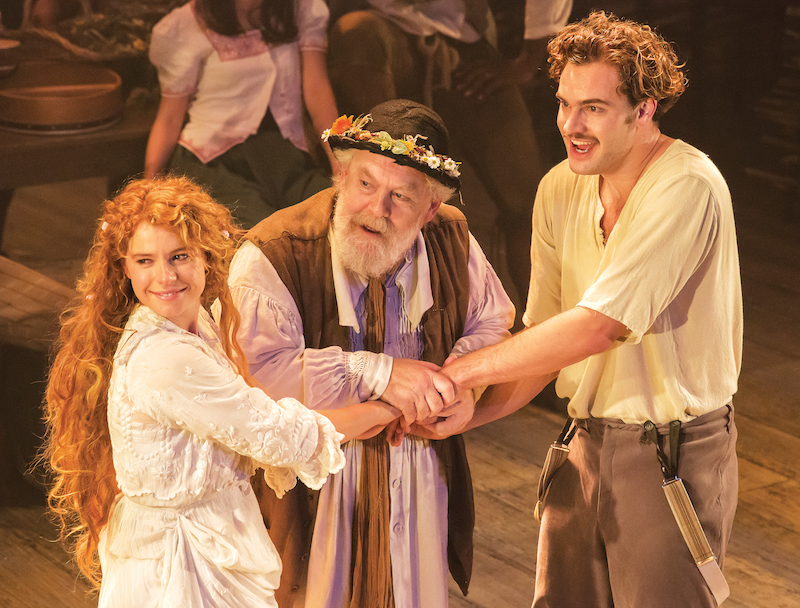 Jessie Buckley’s Perdita is earthy and warmly sensual, but displays, too, the royal dignity inherited from Miranda Raison’s gracious Hermione. (Buckley pictured right with Jimmy Yuill and Tom Bateman.) In fact, this production renders Winter’s Tale a story of sensible women bound to bonkers men, with Hadley Fraser’s Polixenes taking a cue from Branagh and Hulking out when he discovers his son’s deception, and said son, Bateman’s virile Florizel, displaying an equal talent for hot-headed overindulgence.
Jessie Buckley’s Perdita is earthy and warmly sensual, but displays, too, the royal dignity inherited from Miranda Raison’s gracious Hermione. (Buckley pictured right with Jimmy Yuill and Tom Bateman.) In fact, this production renders Winter’s Tale a story of sensible women bound to bonkers men, with Hadley Fraser’s Polixenes taking a cue from Branagh and Hulking out when he discovers his son’s deception, and said son, Bateman’s virile Florizel, displaying an equal talent for hot-headed overindulgence.
Jon Driscoll’s film projections do suggest an interesting queer reading of Leontes and Polixenes’ courtly bromance, though that’s never fully developed, and also find a stylish solution to the most notorious stage direction in theatre. Sunny Afternoon’s John Dagleish is a fine Autolycus, lending the cheeky-chappie rogue an enticing musicality to go with his dark amorality, and there are classy turns from veterans Jimmy Yuill, Michael Pennington and John Shrapnel. Yet this version of Shakespeare’s wistful paean to lost innocence is limited by using the broad brushstrokes of a child’s bedtime story. Though the climactic statue reveal is beautifully done, it’s more a cosy final chapter than a redemptive moment powerfully won.
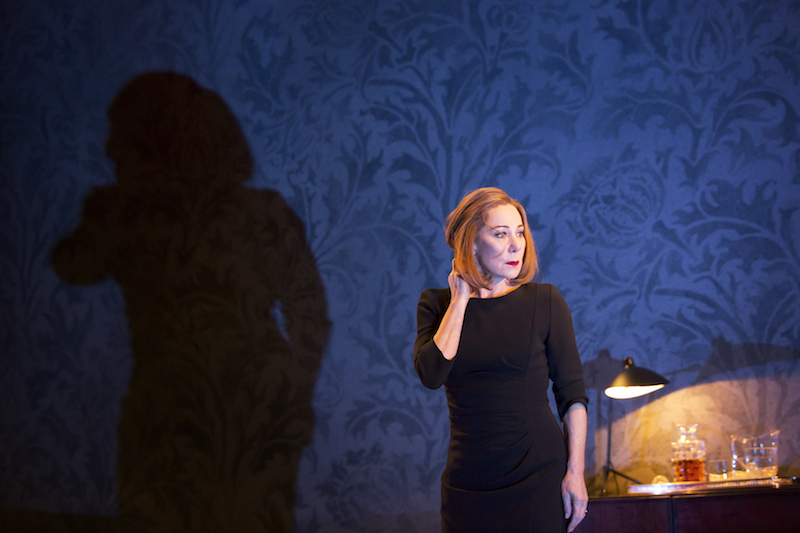 The surprise package is Zoë Wanamaker’s 20-minute monologue, the opening of a beguilingly odd-couple Terence Rattigan double bill (★★★★). Written for television in 1968, All On Her Own is a boozy unburdening jagged with grief and guilt, in which Wanamaker’s not-so-merry widow (pictured above left) confronts the possibility that she drove her socially inferior husband to suicide. It’s a merciless laceration of snobbery, and – in Wanamaker’s starkly vulnerable portrait – illustrates more effectively than Branagh’s Winter’s Tale how persecuting others can also be an act of self-harm. It needs a similarly meditative partner – perhaps The Browning Version (originally paired with Harlequinade), or even Simon Stephens’s comparably raw Song From Far Away – but does provide some much-needed understatement.
The surprise package is Zoë Wanamaker’s 20-minute monologue, the opening of a beguilingly odd-couple Terence Rattigan double bill (★★★★). Written for television in 1968, All On Her Own is a boozy unburdening jagged with grief and guilt, in which Wanamaker’s not-so-merry widow (pictured above left) confronts the possibility that she drove her socially inferior husband to suicide. It’s a merciless laceration of snobbery, and – in Wanamaker’s starkly vulnerable portrait – illustrates more effectively than Branagh’s Winter’s Tale how persecuting others can also be an act of self-harm. It needs a similarly meditative partner – perhaps The Browning Version (originally paired with Harlequinade), or even Simon Stephens’s comparably raw Song From Far Away – but does provide some much-needed understatement.
No such subtlety in the riotous 1948 Harlequinade, which follows the travails of a beleaguered, second-rate rep company bringing Shakespeare to the regions as part of the Government’s wartime “social purpose”. Rattigan’s dismissal of such an enterprise rankles, but there’s guilt-free fun to be had with preening Arthur Gosport, still playing Romeo well into middle age, and his troupe gradually collapsing like their paper-thin sets. It’s Kiss Me, Kate without the songs (a peculiar closing number excepted), or Noises Off without the second and third acts, but delivered with infectious knockabout joy.
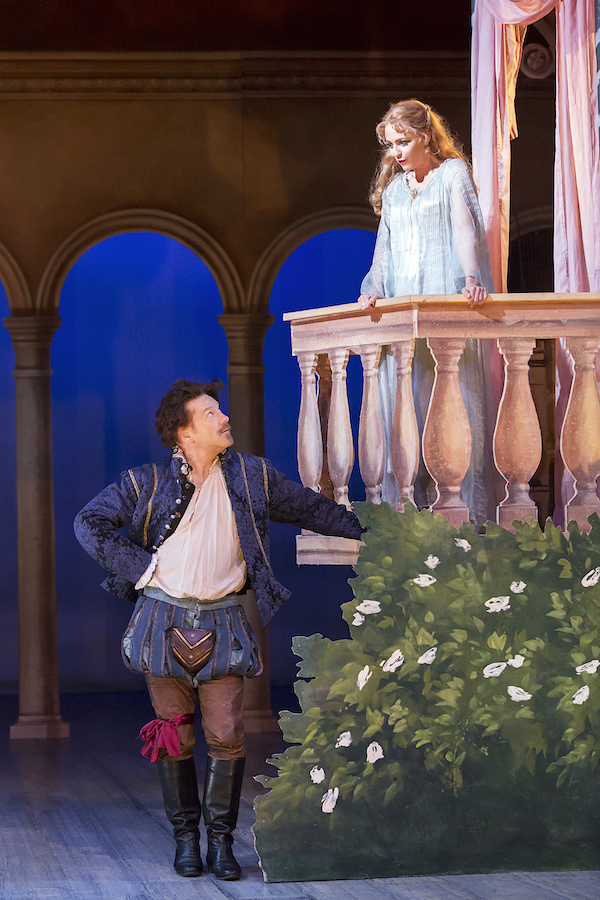 Branagh displays excellent comic chops as pompous, myopic Gosport (pictured right with Miranda Raison), who believes his Romeo can be boyish with the addition of a “little leap” onto a bench, and whose worldview barely extends beyond the wings. He confuses the appearance of a real abandoned daughter with auditions for Perdita (“What text are you using?”), and milks every insincere “darling” and “dear”. Raison, returning as his long-suffering wife, is too young to match his absurdity in playing one of the nubile lovers, but has a good line in teeth-gritting endurance, while Wanamaker is a hoot as a soused, interfering old-timer, as is Bateman’s put-upon stage manager, Fraser’s Brummie spear-carrier and Shrapnel’s failed actor in career crisis.
Branagh displays excellent comic chops as pompous, myopic Gosport (pictured right with Miranda Raison), who believes his Romeo can be boyish with the addition of a “little leap” onto a bench, and whose worldview barely extends beyond the wings. He confuses the appearance of a real abandoned daughter with auditions for Perdita (“What text are you using?”), and milks every insincere “darling” and “dear”. Raison, returning as his long-suffering wife, is too young to match his absurdity in playing one of the nubile lovers, but has a good line in teeth-gritting endurance, while Wanamaker is a hoot as a soused, interfering old-timer, as is Bateman’s put-upon stage manager, Fraser’s Brummie spear-carrier and Shrapnel’s failed actor in career crisis.
“The Gosports are the theatre at its worst and best” proclaims Rattigan, and the same might be said of this opening salvo from Branagh’s season. Stylish and starry (Derek Jacobi, Lily James and Richard Madden are among the big names yet to appear), it’s bound to be a dazzling commercial draw, but just as Harlequinade points out the tendency of thesps to look inward, so there’s a lingering suspicion that this new residential rep company may be as much – if not more – for the benefit of actors as audiences.
Share this article
The future of Arts Journalism
You can stop theartsdesk.com closing!
We urgently need financing to survive. Our fundraising drive has thus far raised £33,000 but we need to reach £100,000 or we will be forced to close. Please contribute here: https://gofund.me/c3f6033d
And if you can forward this information to anyone who might assist, we’d be grateful.

Subscribe to theartsdesk.com
Thank you for continuing to read our work on theartsdesk.com. For unlimited access to every article in its entirety, including our archive of more than 15,000 pieces, we're asking for £5 per month or £40 per year. We feel it's a very good deal, and hope you do too.
To take a subscription now simply click here.
And if you're looking for that extra gift for a friend or family member, why not treat them to a theartsdesk.com gift subscription?
more Theatre
 Shanghai Dolls, Kiln Theatre review - fascinating slice of history inadequately told
Amy Ng's take on two Chinese titans needs more dramatic ballast
Shanghai Dolls, Kiln Theatre review - fascinating slice of history inadequately told
Amy Ng's take on two Chinese titans needs more dramatic ballast
 Manhunt, Royal Court review - terrifyingly toxic masculinity
After his Olivier Award win for Oedipus, Robert Icke turns to a modern “monster”
Manhunt, Royal Court review - terrifyingly toxic masculinity
After his Olivier Award win for Oedipus, Robert Icke turns to a modern “monster”
 Midnight Cowboy, Southwark Playhouse - new musical cannot escape the movie's long shadow
Two misfits misfire in misconceived show
Midnight Cowboy, Southwark Playhouse - new musical cannot escape the movie's long shadow
Two misfits misfire in misconceived show
 Thanks for Having Me, Riverside Studios review - snappily performed comedy with a lightweight core
Writer-actor Keelan Kember floods the stage with a torrent of gags but few ideas
Thanks for Having Me, Riverside Studios review - snappily performed comedy with a lightweight core
Writer-actor Keelan Kember floods the stage with a torrent of gags but few ideas
 Rhinoceros, Almeida Theatre review - joyously absurd and absurdly joyful
Ionesco classic gets an entertainingly vivid and contemporary update
Rhinoceros, Almeida Theatre review - joyously absurd and absurdly joyful
Ionesco classic gets an entertainingly vivid and contemporary update
 The Importance of Being Oscar, Jermyn Street Theatre review - Wilde, still burning bright
Alastair Whatley honours his subject in a quietly powerful performance
The Importance of Being Oscar, Jermyn Street Theatre review - Wilde, still burning bright
Alastair Whatley honours his subject in a quietly powerful performance
 Stiletto, Charing Cross Theatre review - new musical excess
Quirky, operatic show won't please everyone, but will delight many
Stiletto, Charing Cross Theatre review - new musical excess
Quirky, operatic show won't please everyone, but will delight many
 Alfred Hitchcock Presents: The Musical, Theatre Royal Bath review - not a screaming success
1950s America feels a lot like 2020s America in this portmanteau show
Alfred Hitchcock Presents: The Musical, Theatre Royal Bath review - not a screaming success
1950s America feels a lot like 2020s America in this portmanteau show
 Wilko: Love and Death and Rock'n'Roll, Southwark Playhouse review - charismatic reincarnation of a rock legend
Johnson Willis captures the anarchic energy and wit of the late guitarist
Wilko: Love and Death and Rock'n'Roll, Southwark Playhouse review - charismatic reincarnation of a rock legend
Johnson Willis captures the anarchic energy and wit of the late guitarist
 Dear England, National Theatre review - extra time for stirring soccer classic
James Graham adds a neat coda to his ode to decency in sport
Dear England, National Theatre review - extra time for stirring soccer classic
James Graham adds a neat coda to his ode to decency in sport

Add comment